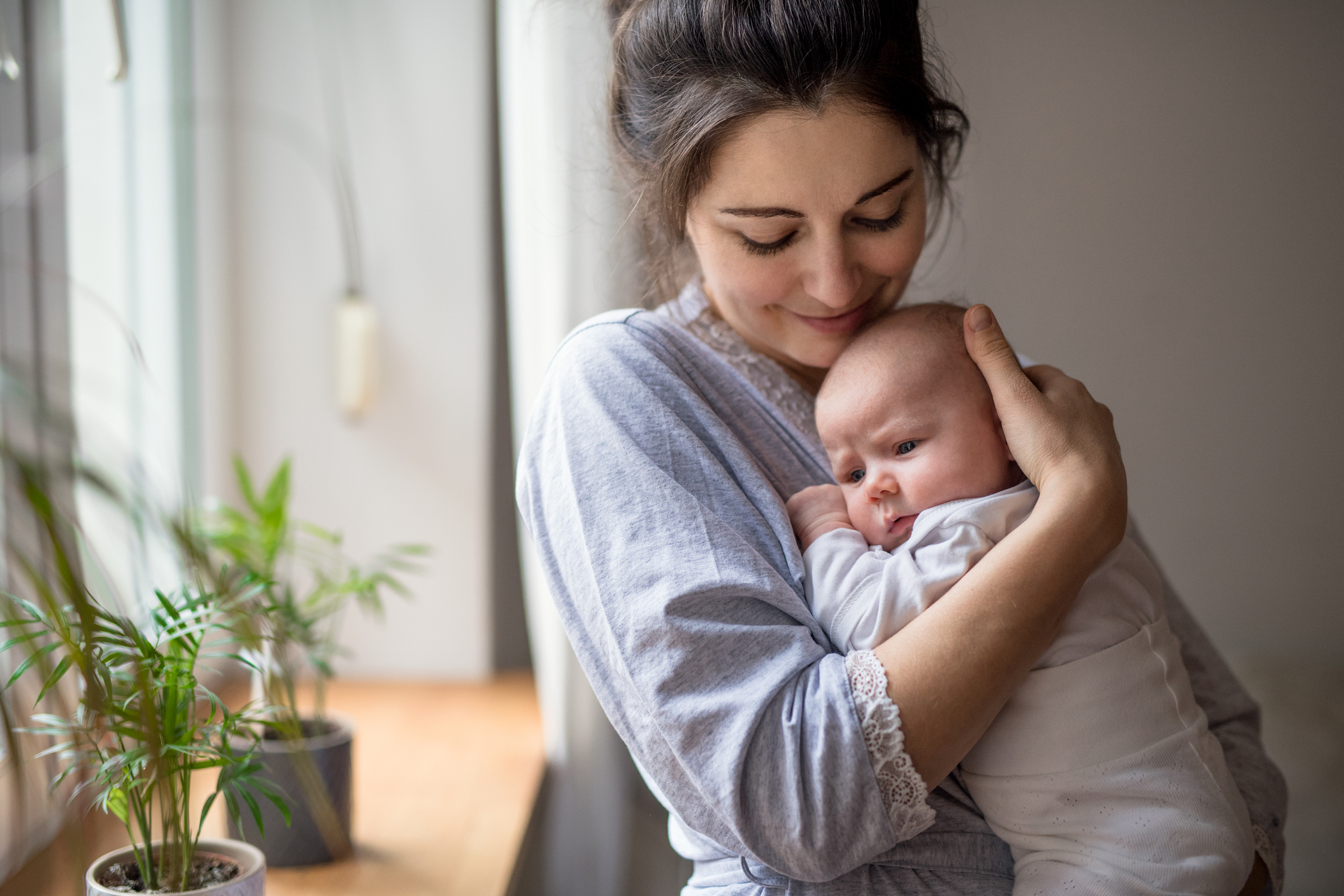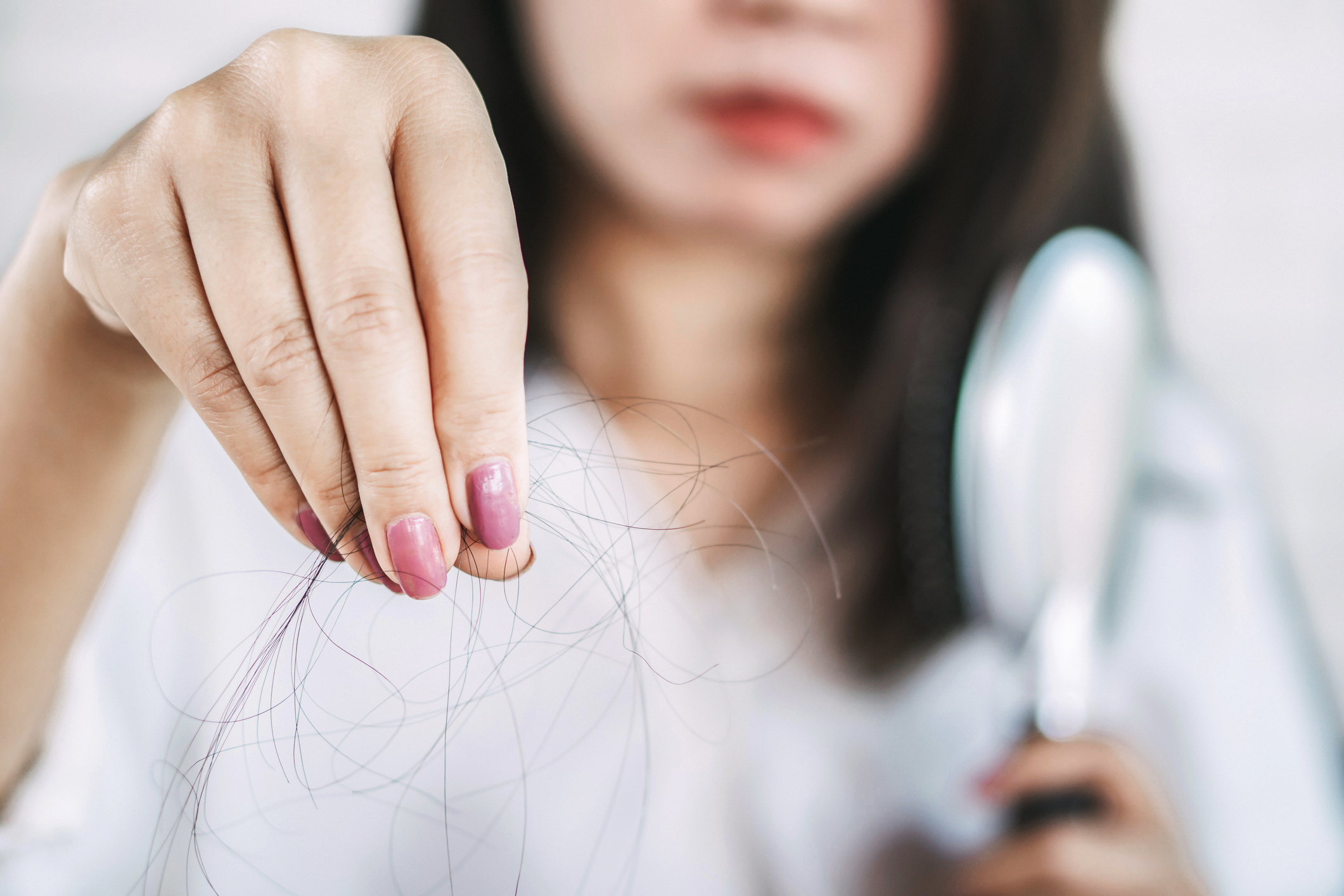Postpartum hair loss: What causes it and how to cope with it

Having a baby is an amazing experience, but can be a stressful one too, which is why the arrival of postpartum hair loss can feel both disorientating and devastating in equal measure.
Gorgeous baby aside, pregnancy can be a whirl of beauty ups and downs, and postpartum hair loss may well leave you looking for ways to speed up hair growth. One minute you’re reeling in the ‘you’re glowing!’ compliments and swishing your newly lustrous and bouncy hair from side to side, the next you’re wondering how to get rid of dark circles under your eyes, and trying not to shed a tear as you unclog a hunk of hair from your plughole.
Many women notice hair loss during the first month after giving birth, whilst for others it can arrive as late as three months after. It’s all down to a surge of hormones during pregnancy. These keep your hair in ‘rest’ mode, but they actually disappear after giving birth, which causes hair loss.
To help you better understand the cause of this sometimes sudden hair fall, and how best to cope with it, we’ve chatted to some of the most trusted experts in the industry.
What is postpartum hair loss?
“Postpartum hair loss is an increase in hair shedding that can occur approximately 6-12 weeks after giving birth,” explains trichologist Anabel Kingsley. “However, some people find it strikes later at around 4-6 months.” You might notice that your hair feels thinner, or that you’re finding more hairs than usual on your hair brush or shower floor.
The shedding normally lasts for around 3 months, but can be longer depending on the individual. “This is especially the case if there have been complications with the pregnancy or health issues for the mother,” adds Dr Martin Wade, dermatologist at The London Skin and Hair Clinic. Some women find that their hair doesn’t start to fall out until after they stop breastfeeding.
It is important to note that not all mothers will experience postpartum hair loss. ”In a study we conducted, we found that approximately 50 percent of women experience partum hair fall,” says Anabel. “We do not know why some women experience it and others do not. It is impossible to predict, and it can also occur after one pregnancy, but not another.”
Postpartum hair loss causes
“During pregnancy, raised oestrogen levels help to keep hairs in their anagen (growth) phase for longer than usual,” advises Anabel. This usually means less hair is shed, particularly towards the end of your 2nd Trimester.” Hair also tends to feel healthier and shinier around this time.
“After giving birth, these levels drop, returning to normal, which can cause all the extra hairs retained during pregnancy to shed in a short period of time,” Anabel continues.
“However, it’s not always as simple or clear cut as hormonal changes. The most important thing to realise with any hair shedding is that hair is not essential to physical survival - so our body views it as a dispensable tissue. Hair is therefore super sensitive to our general state of health - and when anything is amiss internally, or our nutrition is sub-optimal, our hair is often the first thing to suffer. Because of this, it’s really common for hair loss to be more severe, or to continue for longer than it should, due to other factors that commonly happen postpartum.”
Iron deficiency, thyroid imbalances, breastfeeding, lack of sleep and a poor diet can all contribute to the quality of our hair. And all of these are common with new mothers.

How can I stop my hair from falling out after pregnancy?
“Unfortunately, you can’t stop hair shedding that results from that initial drop in oestrogen,’ says Anabel. “If postpartum hair fall is going to occur, it must be left to run its course. But try not to worry, the loss is only temporary and all hairs lost should grow back as usual.”
While there isn’t anything you can do to halt this shedding, there are ways to help keep your remaining hair healthy, avoid losing your locks to any other external factors.
“Support your hair with a healthy, balanced diet with lots of protein and omega oils” advises trichologist and colourist Hannah Gaboardi. “I recommend Hairburst for New Mums which has a really good formula containing biotin, B vitamins and Folic Acid to prevent thinning hair, breakage and encouraging hair growth. They're safe to use during pregnancy and breastfeeding. Minimising heat styling is also a good idea, along with using shampoos and conditioners that are free from parabens and sulphates.”
Can you go bald from postpartum hair loss?
Don’t panic. While it might feel frightening to see such a huge amount of hair shedding, postpartum hair loss will not leave you bald.
“Women do not go bald with postpartum hair loss but the degree of loss can be significant and distressing,’ says Dr Wade. “It is important to remember that this is an alteration of the hair cycle and that there has not been permanent loss of hair and so full regrowth should be possible”
“If your hair loss seems severe, it could be down to a mineral or vitamin deficiency or stress,” adds Hannah. Visit your GP, or make an appointment with a trichologist if you think your postpartum hair loss is lasting for longer than you’d expert, just to make sure there are no other factors or conditions at play.
Will your hair grow back and when?
“While the overall thickness of your hair can drastically decrease, particularly around your temple areas, postpartum hair loss is temporary; the shedding should stop and growth resume as usual within a few months,” reassures Anabel. “How long it takes your hair to recover depends on the length of your hair and if there is anything else other than that initial shift in hormones that might be contributing.”
Patience is your best attribute at this stage, and it can take hair some time to return to its former glory. “Unfortunately hair falls out quickly and grows back a little more slowly. It must also be remembered that hair that is shoulder-length has been growing for three years,” says Dr Wade.
In most cases the hair that grows back will be instantly recognisable. But there have been instances where women have found that the texture of their new hair is slightly different.
“Some people report that their hair can seem thinner, thicker, curlier, finer or more prone to breakage when it grows back as your body is undergoing dramatic changes,” says Hannah. “Therefore it's best to support your hair throughout the pregnancy with a good balanced diet and hair boosting supplements, as well as using volumising and nourishing products.”
Parenting advice, hot topics, best buys and family finance tips delivered straight to your inbox.